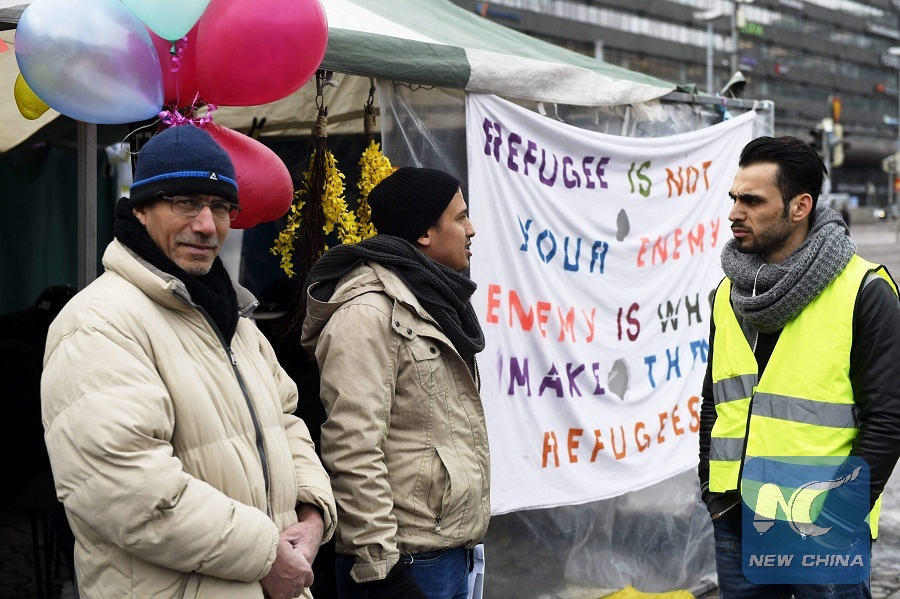
Men stand together at a temporary refugee protest camp at the Central railway station in Helsinki, Finland on March 10, 2017. Asylum seekers protest against the Finnish goverment's deportation policy. (AFP PHOTO/Lehtikuva/Vesa Moilanen)
HELSINKI, Aug. 26 (Xinhua) -- Asylum seekers of Islamic background have increasingly switched to Christianity in Finland, officials have said.
Kari Kiesilainen, a head of section at the Ministry of Justice, told national broadcaster Yle this week that the number of converts has come as a surprise.
He did not give exact figures, but said the situation caused delays in application assessment as often an oral hearing may have to be arranged in the administrative courts.
This year Finnish authorities have rejected more applications than they accepted. Some 2,692 applications led to a status for "international protection", whereas 2,847 were rejected. The rejected applicants can either leave the country or file a complaint to the administrative courts, otherwise they are subject to forced deportation.
Yle reported that a change of religion has been mostly claimed when the first application is dismissed and the applicant files a complaint.
Some political leaders have suggested this week that the processing time should be shortened in order to accelerate the departure of those dismissed. But Kiesilainen said the situation related to religious conversion makes it impossible to speed up the process of complaints.
Especially in recent weeks, the authorities have to take into consideration the change of religion when doing the assessments, as a convert could face serious risks if sent back to his or her country of departure.
Now, the question is, what are the real motives of the converts? Do they really want to get rid of their old religion or just want to increase the chances of staying?
While the civil servants are to shoulder the responsibility to figure out the reality, specialists from the national Evangelic Lutheran Church believe the new converts often take a personal risk in their decision and have usually considered their options carefully.
Marja Laihia, a specialist for immigrant services at the Central Administration of the Finnish Evangelic Lutheran Church, reminded that refugees arrive in an environment of religious freedom, which is new to them.
Talking to Xinhua, she said arrivals have mostly lived in countries were Islam is enforced, either by the state or at least by the extended families. "Now they are in a country where they can choose on their own," she said.
A wave of refugees joining the church runs counter to the general trend in Finland. The Lutheran church has been losing members of late. In the early 1980s well over 90 percent of Finns were in the church, but now the figure is close to 70 percent.
Virpi Koivisto, a chaplain at the Hyvinkaa parish, north of Helsinki, told Xinhua she has got the impression that asylum seekers want to get rid of the religion of their old country.
"But they do not take the decision on light grounds as they run the risk of a conflict with the local expatriate communities and fellow asylum seekers," she said.

